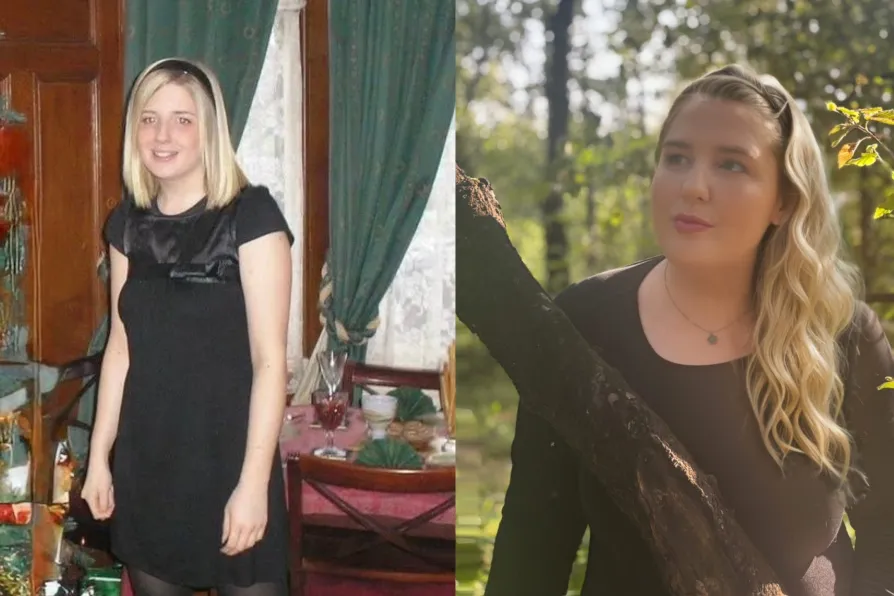As tens of thousands return to the streets for the first national Palestine march of 2026, this movement refuses to be sidelined or silenced, says PETER LEARY
Seventeen years after losing her council job due to needing endometriosis surgery, Michelle Dewar’s campaign for paid menstrual leave gained 50,000 signatures in a week, reports ELIZABETH SHORT

 Left picture shows Michelle at Christmas undergoing a chemical menopause at aged 23 when she had just lost her job
Left picture shows Michelle at Christmas undergoing a chemical menopause at aged 23 when she had just lost her job
PAID leave for debilitating periods shouldn’t be a luxury. It could mean the difference between losing and keeping a job.
Michelle Dewar knows this struggle all too well. And it’s one of the reasons she’s been fighting to get this right written into law.
In just over a week, her petition for paid menstrual leave for those with severe conditions racked up over 50,000 signatures. Its rapid support is a testament to just how desperately it is needed.
The campaign was inspired by recent legislation passed in Portugal.
“I was driving my car when I heard it on the radio. I was like — that is groundbreaking. We need something similar here,” Dewar says.
Mirroring the Portuguese law, the petition calls for three days of monthly menstrual leave for those with conditions such as dysmenorrhea (painful menstrual cramps), endometriosis (when tissue similar to the lining of the womb grows outside it) and adenomyosis (when the lining of the womb grows into its muscular wall).
But the fight goes beyond just time off. The petition demands full protections at work, including a guarantee of confidentiality and non-discrimination.
Dewar’s story is a painful reminder of what’s at stake. From the age of 14, she suffered crippling pain so severe that she was regularly sent home from school.
She was eventually prescribed pain medication, but this still disrupted her studies. “[They] made me very tired, so I was still often having to go home to sleep,” she says. When she turned 23, things took a turn for the worse.
“I was hospitalised — three months in a row,” she says.
A junior doctor acknowledged endometriosis as a possibility, but insisted that if she did have it, it would likely be early onset due to her age, and could be managed with birth control.
Fortunately, a consultant disagreed. Further examination revealed she had stage four endometriosis, including in her bowel, and that she would need to undergo a chemical menopause.
“I essentially lost my job. I physically couldn’t be at my work,” Dewar says.
She had been working at a local council, and assured that funding had been secured to make her position permanent.
But when she explained to her boss that she needed 4-12 weeks off for an operation, she was suddenly told there was no funding available.
“Because she hadn’t given me the physical written contract, there was nothing I could do.”
Dewar was suddenly left jobless, facing chemical menopause, and grappling with the possibility of needing a hysterectomy — all at the same time.
Years on, the experience still drives her fight for justice.
“This was 17 years ago that happened to me,” Dewar says.
“I would like to have seen some major progress — I have not.”
“This is still happening to young girls, to women that are my age, to women that are trying to conceive in their thirties.
“It’s heartbreaking. I don’t want anybody else to ever feel like that.”
Roughly one in 10 women suffers from endometriosis.
The NHS rated it as one of the most painful conditions someone can have. Many have to take morphine to cope with the pain.
Yet gynaecological waiting lists are among the longest in the health service, and the average time to receive a diagnosis is nine years.
Dewar’s fight is a selfless one. Having since had a hysterectomy, she won’t benefit personally from paid menstrual leave. “But if I’d had that in place when I was younger, I feel like I wouldn’t have lost the job that I did.”
“And on the mental health side of things, [it would have meant] not worrying about if I’m going to end up off work when my period comes.”
The campaign has received support far and wide and is inclusive towards anyone who menstruates.
“I stand with anybody that menstruates, and has any condition, regardless if they’re transgender, non-binary, or anything else. I’m a huge LGBTQ+ ally,” Dewar says.
The campaign’s Instagram page — MM Endometrosis — is scattered with powerful stories.
There’s Ose, a mental health nurse who has severe pelvic pain, lower back pain, and chronic fatigue, yet has pushed through meetings and school runs while quietly suffering.
And Emma, a sensory support teaching assistant who repeatedly had her pain dismissed, and now has to use a cane, take morphine and cut her work hours in half.
On September 6, Dewar will join many others in London for a demonstration calling for paid menstrual leave.
Sponsored by Your Endo Events, which is run by Laura Potts, it will begin at 1pm in Parliament Square. Attendees can expect giveaways and useful resources on the day.














